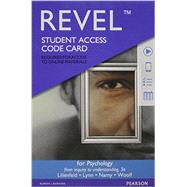REVEL™ for Psychology: From Inquiry to Understanding teaches students how to test their assumptions, and motivates them to use scientific thinking skills to better understand the field of psychology in their everyday lives. By applying scientific thinking, students can more intelligently evaluate claims about both laboratory research and daily life. In the end, students will emerge with the “psychological smarts,” or open-minded skepticism, needed to distinguish psychological misinformation from credible, useful psychological information.
REVEL is Pearson’s newest way of delivering our respected content. Fully digital and highly engaging, REVEL offers an immersive learning experience designed for the way today's students read, think, and learn. Enlivening course content with media interactives and assessments, REVEL empowers educators to increase engagement with the course, and to better connect with students.
NOTE: REVEL is a fully digital delivery of Pearson content. This ISBN is for the standalone REVEL access card. In addition to this access card, you will need a course invite link, provided by your instructor, to register for and use REVEL.








